The Zika Virus
What You Need to Know
How Zika spread from Africa
This map illustrates how the disease has spread from Africa and has now reached South America, Central America and even North America.
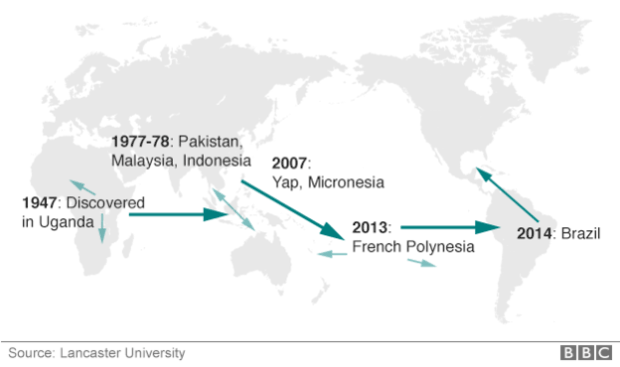
About the Disease
Zika virus disease is caused by a virus transmitted by Aedes mosquitoes. People with Zika virus disease usually have a mild fever, skin rash (exanthema) and conjunctivitis. These symptoms normally last for 2 to 7 days. There is no specific treatment or vaccine currently available. The best form of prevention is protection against mosquito bites. The virus is known to circulate in Africa, the Americas, Asia and the Pacific. The World Health Organization (WHO) has declared the Zika virus a global public health emergency. The WHO alert puts Zika in the same category of concern as Ebola.
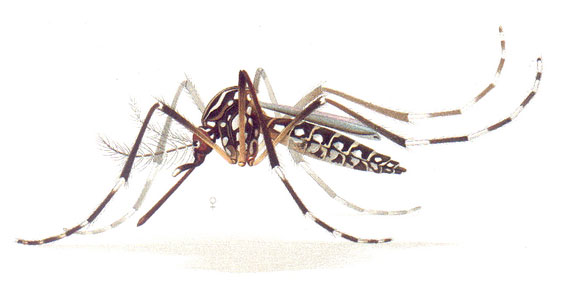
History
Zika virus is an emerging mosquito-borne virus that was first identified in Uganda in 1947 in rhesus monkeys through a monitoring network of sylvatic yellow fever. It was subsequently found in humans in 1952 in Uganda and the United Republic of Tanzania.
From its discovery until 2007, confirmed cases of Zika virus infection from Africa and Southeast Asia were rare. In 2007, however, a major epidemic occurred in Yap Island, Micronesia. It was the first time Zika virus had been detected outside Africa and Asia In total, the Yap Islands outbreak had 49 confirmed and 59 probable cases of Zika virus disease. None of the patients required hospitalization. No hemorrhagic manifestations occurred and no deaths resulted. Aedes hensilli was the predominant mosquito species identified.
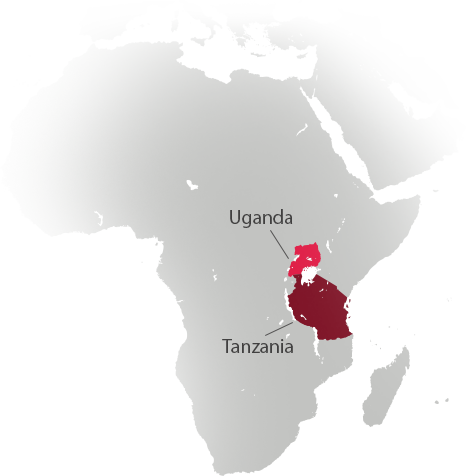
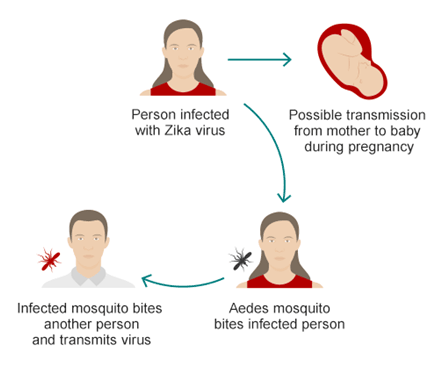
Transmission
Zika virus is transmitted to people through the bite of an infected mosquito from the Aedes genus, mainly Aedes aegypti in tropical regions.
This is the same mosquito that transmits dengue, chikungunya and yellow fever.
Aedes aegypti is a vector for transmitting several tropical fevers. Zika virus can migrate between humans through sexual contact and it can also cross the placenta, affecting an unborn fetus. The vertebrate hosts of the virus are primarily monkeys and humans.
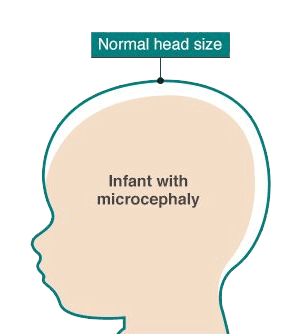
What is Microcephaly?
Symptoms include below-average head size Often caused by failure of brain to grow at normal rate. Head circumference measuring less than 31.5-32cm. Affects 25,000 children in US each year
It is when a baby is born with an abnormally small head, as their brain has not developed properly. The severity varies, but it can be deadly if the brain is so underdeveloped that it cannot regulate the functions vital to life. Children that do survive face intellectual disability and development delays.
It can be caused by infections such as rubella, substance abuse during pregnancy or genetic abnormalities.
Biting Behavior
Aedes aegypti bites primarily during the day. This species is most active for approximately two hours after sunrise and several hours before sunset, but it can bite at night in well-lit areas. This mosquito can bite people without being noticed because it approaches from behind and bites on the ankles and elbows. To find a host, these mosquitoes are attracted to chemical compounds emitted by mammals. Only females bite to obtain blood in order to lay eggs.
Diagnosis
Zika virus is diagnosed through PCR (polymerase chain reaction) and virus isolation from blood samples. Diagnosis by serology can be difficult as the virus can cross-react with other flaviviruses such as dengue, West Nile and yellow fever. Serology is the scientific study or diagnostic examination of blood serum, especially with regard to the response of the immune system to pathogens or introduced substances.
Treatment
Zika virus disease is usually relatively mild and requires no specific treatment. People sick with Zika virus should get plenty of rest, drink enough fluids, and treat pain and fever with common medicines. If symptoms worsen, they should seek medical care and advice. There is currently no vaccine available.
Prevention
Mosquitoes and their breeding sites pose a significant risk factor for Zika virus infection. Prevention and control relies on reducing mosquitoes through source reduction (removal and modification of breeding sites) and reducing contact between mosquitoes and people. This can be done by using insect repellent; wearing clothes (preferably light-colored) that cover as much of the body as possible; using physical barriers such as screens, closed doors and windows; and sleeping under mosquito nets. It is also important to empty, clean or cover containers that can hold water such as buckets, flower pots or tires, so that places where mosquitoes can breed are removed.
During outbreaks, health authorities may advise that spraying of insecticides be carried out. Priorities are to protect pregnant women and their babies from harm and to control the mosquitoes that are spreading the virus. Pregnant women are advised to consider delaying travel to areas affected by Zika and to seek advice from their physician if they are living in areas affected by Zika.
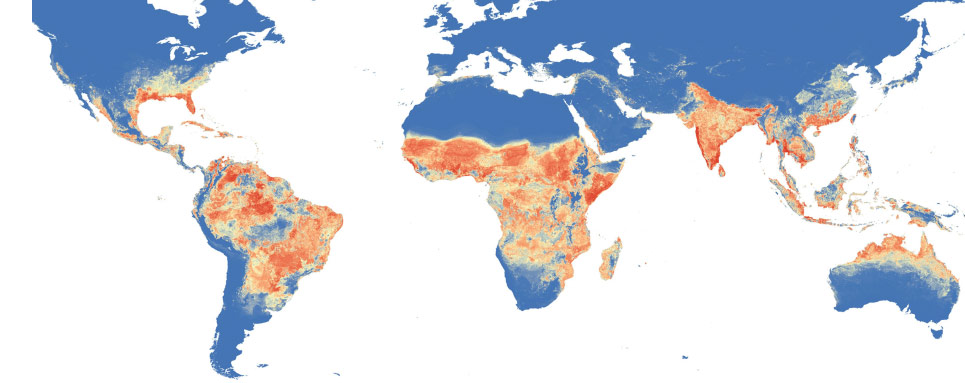
Global Impact
Prior to 2015, Zika virus outbreaks have occurred in areas of Africa, Southeast Asia, and the Pacific Islands. In May 2015, the Pan American Health Organization (PAHO) issued an alert regarding the first confirmed Zika virus infections in Brazil.
Currently, outbreaks are occurring in many countries.
Zika virus will continue to spread and it will be difficult to determine how much the virus will spread over time.
Zika virus is now spreading rapidly in South and Central America and the Caribbean. Honduras has declared a state of emergency after officials said the number of Zika infections is rising at an “alarming” rate in the Central American country.
Since December 16 2015, when the first case of the mosquito-borne virus was detected, there have been 3,649 cases of people infected with the virus (in Honduras).
Two adults confirmed with Zika virus in Ireland.
Brazil had fewer than 150 cases of microcephaly in the whole of 2014. But more than 4,700 cases have been reported since 22 October 2015, with 404 confirmed and 3,670 still being investigated.
Zika in the United States and its Territories
In Dallas, health officials on Tuesday 2nd February reported that a person in Texas has become infected with the Zika virus through sex in the first case of the illness being transmitted within the United States amid the current outbreak in Latin America. The unidentified person had not traveled but had sex with a person who had returned from Venezuela and fallen ill with Zika, Dallas County health officials said.
Locally transmitted Zika virus has been reported in the Commonwealth of Puerto Rico. With the recent outbreaks, the number of Zika cases among travelers visiting or returning to the United States will likely increase. These imported cases could result in local spread of the virus in some areas of the United States.
Reported Active Transmission

Microcephaly in Brazil
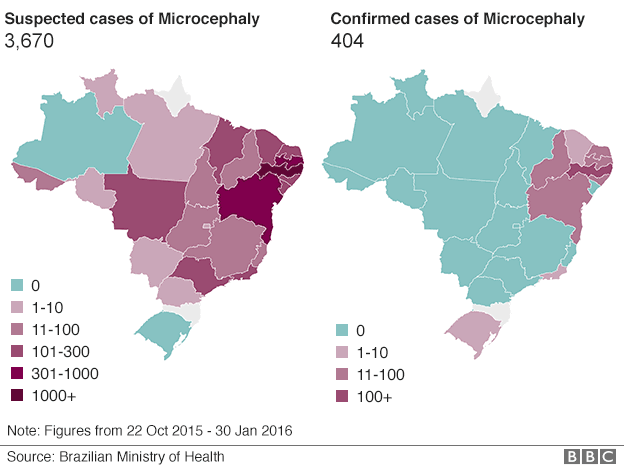
Global Response
The Middle East’s biggest airline is offering refunds to passengers booked on flights to countries affected by the Zika virus.
The President of Honduras; Juan Orlando Hernandez allocated an initial tranche of $10 million in an attempt to halt the spread of the virus.
Brazilian officials have announced measures to prevent the spread of the Zika virus during the Rio de Janeiro Olympic Games later this year (2016). Organizers said on Sunday 31st of January (2016) that venues used at the Olympics in August will be inspected daily during game times in a bid to prevent the spread of the mosquito-borne virus that has been linked to a rare birth defect and also a condition that can cause paralysis.
The Rio 2016 local organizing committee said inspectors will try to eliminate stagnant waters where mosquitoes breed. If necessary, they said, they would fumigate Olympics sites before the Games. Brazil warned pregnant women Monday to stay away from the Olympics. There is no chance that the Rio Olympics will be cancelled because of a Zika virus outbreak, Brazil has said.
“Eighty percent of the people infected by Zika do not develop significant symptoms. A large number of people have the virus with no symptoms, so the situation is more serious that we can imagine,” Castro said in an interview.
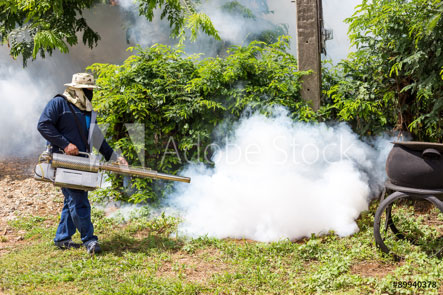
The Brazilian Health Minister, Marcelo Castro, has said a new testing kit is being developed to identify infections quickly.
He also said more money was being put into the development of a vaccine.
Some scientists are also trialing the use of genetically modified sterile mosquitoes that appear to reduce mosquito populations by 90%.
UNICEF is asking for $9 million for its programs in the Americas to curb the spread of Zika virus and lessen its impact on babies and their families across the region.
EcoZAP Activator — A Natural Synergist
When added to conventional pesticides as a tank mix, EcoZap Activator has been proven to enhance the efficacy of pesticides labeled for mosquito control against pyrethroid-resistant (Aedes aegypti) (KDR- CDC Puerto Rican strain).


